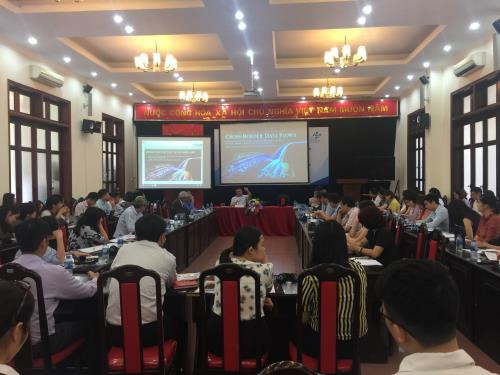Hanoi (VNA) – A workshop onCross-border Data Flows took place in Hanoi on May 3 to discuss the importanceof data access and sharing and the need to develop a legal framework on datamanagement to boost the growth of digital economy.
The event was co-held by the CentralInstitute for Economic Management (CIEM) and the Asia Cloud ComputingAssociation (ACCA).
Delegates talked about the prospects ofVietnam’s economy in the fourth Industrial Revolution (Industry 4.0) and thedevelopment of digital platforms for e-commerce, e-services and infrastructurefor cyber-security. They also outlined Vietnam’s opportunities and challengesin effectively forming a management system of new digital tools in business.
Speaking at the event, ACCA ExecutiveDirector Lim May Ann announced a report on “Cross-Border Data Flows: A Reviewof the Regulatory Enablers, Blockers, and Key Sectoral Opportunities in FiveAsian Economies: India, Indonesia, Japan, the Philippines and Vietnam.” Thereport provides an overview of the current policies on data management in thesenations and their impacts on the economic growth at large and the developmentof small- and medium-size enterprises.
It takes an investigative look at theway the five Asian economies are aggressively transitioning to more digitallyenabled economies. While there are similarities in the drivers of thesetransitions, there are also significant differences in the approaches being adopted.
The Philippines, for example, has noexplicit “digital economy” policy, whereas India has become “Digital India” andJapan is striving to be the “World’s Most Advanced IT Nation.” Conversely, thePhilippines has no explicit cross-border data flow restrictions and was thefirst Southeast Asian country to formally adopt a “Cloud First” approach.
Vietnam today is among countries withhigh numbers of Internet users, estimated to account for over 50 percent of thepopulation; and the Internet access rates in the country are on a par withothers in the region, said former Standing Deputy Minister of Post andTelecommunications Mai Liem Truc. These have significant impacts on thecountry’s digital economy, he noted.
According to the ACCA, Vietnam holdshuge potentials to expand the digital economy but the country’s legalenvironment for cross-border data flows is not as open as compared to otherfour nations. The ACCA cited a number of provisions of the Law on NetworkInformation and Security, which require cooperation with the government andfacilitate State agencies in carrying out “technical measures” when necessary,which imply allowing the Government to access encrypted information that couldundermine users and personal privacy in Vietnam.
Secondly, Decree 72/2013/ND-CP onManagement, Provision and Use of Internet Services and Online Informationrequires IT companies to establish at least one server inside the country to “servethe inspection, storage, and provision of information at the request ofcompetent state management agencies”. At the same time, CircularNo.38/2016/TT-BTTTT, one of the documents guiding the implementation of Decree72, also contains detailed regulations on the cross-border provision of publicinformation. Certain providers of such content are required to implementcontent restrictions related to national and social security.
Thirdly, the country has got tougher ontaxation of the digital economy with stricter regulations for taxing incomederived from Vietnam by digital companies from social media, accommodation andride sharing sectors.
Lim May Ann suggested that theGovernment of Vietnam should adopt a more cautious approach to ensure thatbuilding a safe cyber environment does not inadvertently restrict and hamperthe potential of the digital economy and the entire economy at large.-VNA





























